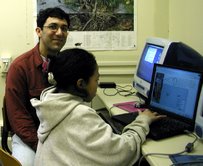A Quote by Jaron Lanier
The basic problem is that web 2.0 tools are not supportive of democracy by design. They are tools designed to gather spy-agency-like data in a seductive way, first and foremost, but as a side effect they tend to provide software support for mob-like phenomena.
Related Quotes
I feel like the beauty of this age of filmmaking is that there are more tools at your disposal, but it doesn’t mean that any of these new tools are automatically the right tools. And there are a lot of situations where we went very much old school and in fact used CG more to remove things than to add things.







































